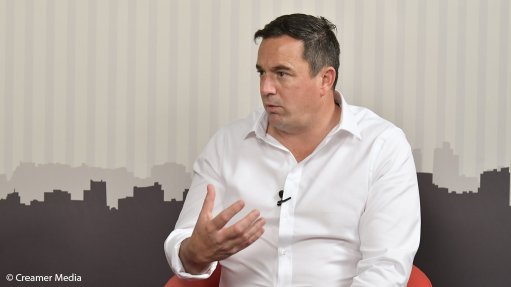
DA leader John Steenhuisen
Photo by: Donna Slater
Democratic Alliance (DA) leader John Steenhuisen revealed on Monday that several DA-run metros and municipalities are well underway in their efforts to become less reliant on Eskom, if national government were to simply “get out of the way”.
South Africa has being hit by the worst power outages in more than two years as power utility Eskom contends with multiple plant breakdowns.
“The most important piece of advice we can give the President is that he should get his government out of the way of those who want to, and who are able to, fix this mess. Capable local governments, in particular, can do much to shield their residents from load-shedding while also relieving the pressure off Eskom, if national government were to simply get out of the way,” Steenhuisen stressed.
He stated that many of the obstacles to increased electricity generation are self-imposed by government.
“Whether it’s by standing in the way of municipalities who want to procure or generate their own electricity, whether it’s through onerous regulations on small-scale generation, or any of the other counter-productive regulations around preferential procurement or local content requirement, this national government has consistently been the biggest part of the problem,” he said.
Steenhuisen has outlined to President Cyril Ramaphosa urgent steps aimed at securing short-term electricity supply, and medium-term steps which he said will take a little longer but are critical to the sustainability of the country’s energy sector.
He explained that in the short term, Ramaphosa must declare a ring-fenced State of Disaster in the electricity sector which will suspend all legislation currently blocking solutions to this crisis, and issue a blanket Section 34 determination so that all municipalities in good financial standing can procure, generate and store their own electricity.
Steenhuisen said the President must incentivise and ease the regulations on small-scale embedded generation such as rooftop solar and waive all local content requirements for electricity procurement and preferential procurement requirements.
MEDIUM-TERM INTERVENTIONS OUTSIDE OF ESKOM
He said medium-term interventions outside of Eskom must be implemented right away, and he urged Ramaphosa to form an Emergency Electricity Commission, headed up by a power utility specialist, to deal with the crisis.
He also suggested updating the Integrated Resource Plan (IRP), the establishment of an Independent System Market Operator so that the transmission grid can run separately from Eskom and the aggressive pursuit of new generation capacity from diverse sources and technologies.
He said government ought to establish proper governance structures to oversee foreign funding of the country’s transition away from fossil fuels and invest in grid infrastructure and system upgrades. He pointed out that building more storage capacity, investing in the technology of batteries and other forms of storage would take a lot of pressure off Eskom.
MEDIUM-TERM INTERVENTIONS INSIDE ESKOM
Meanwhile, Steenhuisen stressed the need for government to deal with sabotage through integrated security and intelligence measures by vigorously prosecuting saboteurs. He said Eskom must also employ engineers and "cut the dead wood”.
Ramping up maintenance on Eskom’s generation fleet and reviewing all Eskom coal contracts to eradicate corruption and ensure best-price contracts is crucial, he noted.
“Each of these steps is critical to the recovery of our electricity generation capacity, and they must be announced without delay. If ever there was a moment to shake this presidency from its slumber and inaction, it is this electricity crisis which threatens to sink our economy and plunge millions more South Africans into unemployment and poverty,” he said.
Meanwhile, Steenhuisen welcomed the City of Cape Town’s announcement that it would now pay cash – as opposed to credits on bills – for excess electricity generated by commercial and industrial generators to incentivise them to feed as much energy as possible back to the grid.
“We also welcome their announcement that commercial and industrial generators will now be allowed to sell more electricity to the City than they use (in the past they were required to be net consumers). Both these steps are firsts in South Africa, and the goal is to extend this to residential customers too, once the take-up by industrial and commercial generators has been ascertained,” he added.